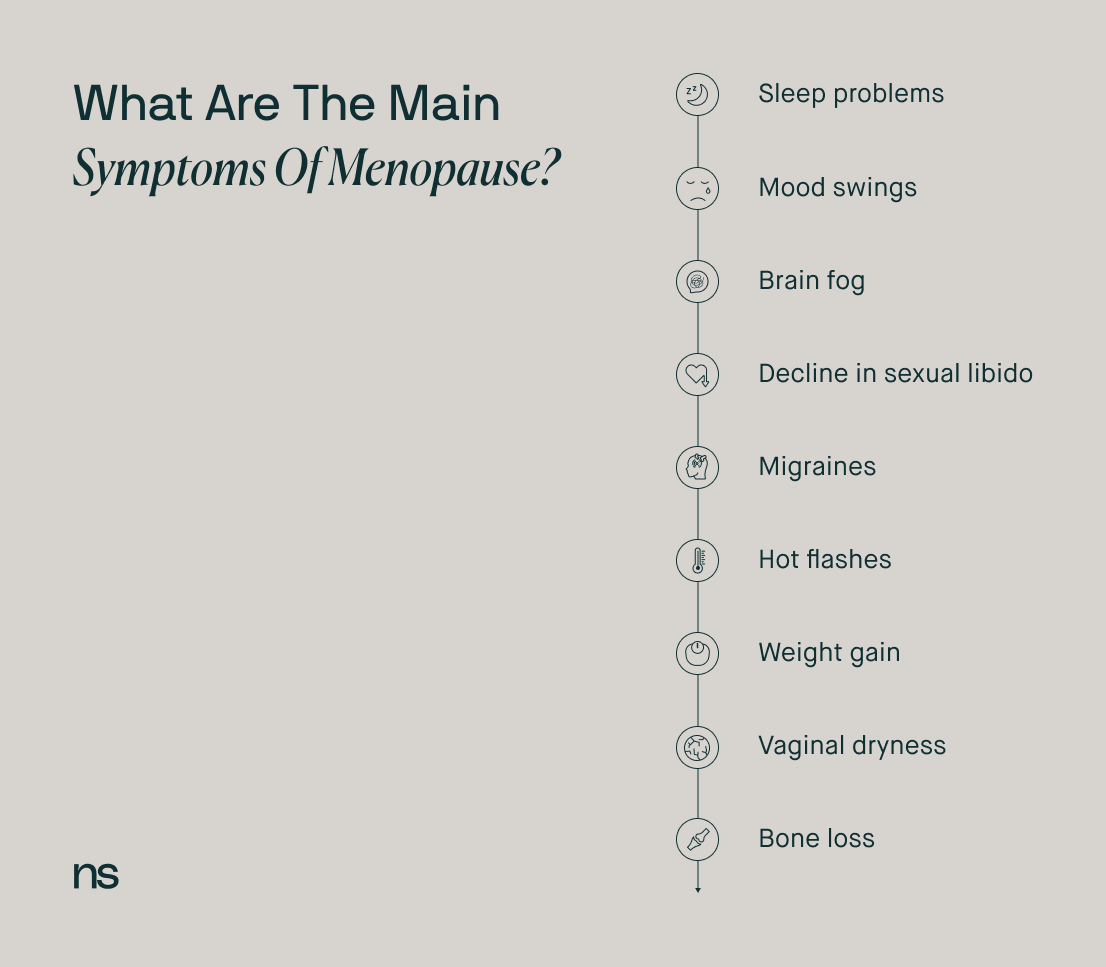The Role of Magnesium in Menopause: What You Need to Know

Key Takeaways
Menopause is the natural biological process that marks the end of your menstrual cycles. For many women, however, this transition can come with unpleasant symptoms.
Some research has suggested potential treatment options that may help reduce these symptoms, such as specific dietary changes and hormone therapy. But is there anything else out there that might be helpful to try if you’re a woman going through menopause?
Interestingly, magnesium shows promise for reducing risk for menopausal concerns such as osteoporosis, heart health, and even hot flashes.
Read on to learn more about magnesium, its effects on the body, and the role this mineral may play in supporting a healthy menopause transition.
Why You Need Magnesium
Magnesium is an essential mineral that your body requires for several functions, including muscle, nerve, and immune function, energy production, managing blood sugar, regulating blood pressure, and making protein, bones, and DNA.
Magnesium also plays a role in sleep quality—studies show that magnesium can improve many of the hallmarks of insomnia for some people, including sleep efficiency, sleep time, sleep onset latency, and early morning waking. Low levels of magnesium are associated with fatigue and poor sleep - including insomnia.
It also plays a structural role in bones, cell membranes, and chromosomes. Magnesium is involved in more than 300 essential metabolic reactions, including:
- The metabolism of carbohydrates and fats to produce energy
- Synthesis of DNA, RNA, proteins, and glutathione, an important antioxidant
- The transport of ions across cell membranes, which affects the conduction of nerve impulses, muscle contraction, and normal heart rhythm
- The healing of wounds
- Cell signaling and cell migration
Menopause and Its Symptoms

The menopause transition typically occurs in your 40s or 50s, with the median age of menopause in the U.S. being 51.5 years old. It is determined after you’ve gone 12 months without a menstrual period.
During perimenopause, which is the time during which your body makes this transition, your estrogen levels begin to fall, leading to many changes in the body. The signs and symptoms that women experience may vary among individuals, but they often include:
- Bone loss
- Vaginal dryness
- Weight gain
- Hot flashes
- Night sweats
- Migraines and tension headaches
- Decline in sexual libido
- Changes in breast size
- Brain fog
- Mood swings and changes, including increased anger, irritability, anxiety, and depression
- Sleep problems
Is Magnesium Good for Menopause?
There’s a good amount of research out there surrounding magnesium and the potential benefits it can have for women’s health. But can magnesium have beneficial effects for menopausal women experiencing any of the symptoms associated with this transition?
This important mineral can support a number of the concerns that come with menopause, including bone health, mood changes, heart health, and even hot flashes. Estrogen is known to influence magnesium distribution and excretion. As estrogen declines in menopause, your magnesium status may be impacted.
Let’s take a closer look at the potential benefits of magnesium on menopause symptoms.
Can Support Bone Health

According to the Endocrine Society, one in two postmenopausal women will have osteoporosis, and most will suffer a fracture in their lifetime. Magnesium deficiency has been found in 84 percent of postmenopausal women with osteoporosis.
Throughout early life, our bones are constantly remodeling and strengthening themselves through a process of resorption, or breaking down old bone tissue, and production of new tissue. During menopause, estrogen deficiency can lead to more breaking down of bone tissue than can be replenished, leading to bone loss and osteoporosis.
Magnesium supplementation has been shown to improve bone health in a few ways. It may:
- Reduce inflammation and oxidative stress, which are risk factors for osteoporosis.
- Slow down bone resorption by significantly increasing levels of osteocalcin, a protein needed for bone growth.
Magnesium is also needed for activation of vitamin D. Low levels of vitamin D can contribute to the onset of osteoporosis by reducing calcium absorption.
May Ease Depression
Studies show that people undergoing menopause have an increased risk for major depressive disorder. Researchers believe this may be influenced by a mix of factors, including
- The quality of your social environment
- Health status
- Psychological factors
- Genetics
- Race and ethnicity
- Fluctuations in steroid and hormone levels associated with menopause
While the reason remains unknown, magnesium supplementation is shown to alleviate symptoms of depression. In one observational study of postmenopausal women, the lowest magnesium levels were observed in women who has symptoms of depression.
This may be because magnesium deficiency is known to change the functioning of your central nervous system, particularly in regions of the brain that play important roles in the development of depression.
However, data on this subject is scarce and more research is needed to establish the definitive link between magnesium intake and depression.
Can Support Heart Health

The estrogen deficiency that results from menopause can have a negative effect on heart health. While menopause itself does not cause heart disease, low estrogen levels are associated with factors that can raise the risk for cardiovascular disease.
These factors include higher levels of LDL cholesterol, insulin resistance, high blood pressure, increased central fat, and inflammation. However, studies have shown that magnesium is crucial for the activation of enzymes that keep the heart functioning.
This may be one reason why low magnesium intake is associated with compromised cardiovascular health in postmenopausal women. Conversely, a high magnesium intake is associated with markers of better heart health in postmenopausal women.
May Help With Hot Flashes
Hot flashes are the most common symptom of menopause and affect 75 percent of women. Hot flashes can be uncomfortable, cause distress, and disrupt sleep. Some studies have found magnesium supplements to be a promising aid in reducing hot flashes.
A pilot phase II trial of women with breast cancer who reported at least 14 hot flashes per week found that half of the participants were helped by magnesium supplementation. However, a larger randomized controlled study found that magnesium had no statistically significant effect on hot flashes.
More research is needed to determine whether magnesium can help with hot flashes.
Which Magnesium is Best for Menopause?
There's no evidence that magnesium from supplements is preferable for health outcomes compared to magnesium sourced from whole foods. Since whole foods provide a variety of key nutrients, it's always a good idea to first prioritize meeting your magnesium needs with whole food as much as possible.
If you find you still need supplemental magnesium, it's important to choose a product with high bioavailability from a reputable brand with high quality standards.
Magnesium Supplements for Menopause
There are many different types of oral magnesium supplements, and they're not all created equally in terms of bioavailability. Magnesium supplements can come in the form of:
- Magnesium glycinate
- Magnesium malate
- Magnesium aspartate
- Magnesium citrate
- Magnesium sulfate
- Magnesium oxide.
The glycinate, malate, or aspartate forms are some of the best absorbed. Steer clear of oral magnesium oxide and sulfate, which have relatively poor bioavailability. Magnesium chloride is a common form of topical magnesium, though topical magnesium remains controversial and its effectiveness hasn't been well-studied.
Consult a registered dietitian or healthcare professional to determine which supplement may be right for you and whether or not you may need an extra boost of this mineral.
Dietary Sources of Magnesium

According to researchers, the recommended daily value of magnesium is about 320 milligrams per day for women and 420 milligrams per day for men. To make sure you are consuming enough magnesium for your personal needs, you may need to consider factors like:
- Sex
- Age
- Whether you are pregnant of breastfeeding
Dietary supplements can help you reach your recommended daily value, but whole food sources are preferable. Luckily, magnesium is naturally found in quite a few foods such as beans, legumes, whole grains, nuts and seeds, and leafy green vegetables.
Some magnesium-rich foods you may consider including in your diet include:
- Legumes, like black beans and edamame (soybeans)
- Nuts, especially almonds, cashews, and peanuts
- Seeds, especially flax seeds, chia seeds, and pumpkin seeds
- Whole grains, like whole wheat bread, oatmeal, and brown rice
- Milk and yogurt
- Leafy green vegetables, especially spinach
Magnesium and Blood Sugar

Magnesium is important to blood sugar as it plays a role in the management of hyperglycemia, hyperinsulinemia, and insulin resistance. Consequently, magnesium deficiency is also associated with an increased risk of type 2 diabetes and a worsening of insulin resistance.
One 2015 study found that magnesium supplementation may help improve insulin resistance, oxidative stress, and systemic inflammation in people with type 2 diabetes. Other studies have shown that magnesium supplements may improve fasting glucose and postprandial glucose.
However, neither study controlled for dietary magnesium content, so it’s still unknown whether or not supplements would be more beneficial than increasing dietary magnesium sources. More research is needed to establish a direct link between magnesium supplements and blood sugar response.
Magnesium and Menopausal Weight Gain
Though there is limited research showing a direct link between magnesium intake and weight status in menopause, adequate magnesium may still play a role in supporting a healthy weight. Due to magnesium's role in so many metabolic pathways, including regulation blood sugar and hormone metabolism, it's possible that deficiency could negatively impact weight for some people.
Though magnesium deficiency should be corrected, there's no evidence that consuming excess magnesium above the RDA is beneficial for health, including weight.
Who is at Risk for Magnesium Deficiency?
People with certain health conditions may be at higher risk for magnesium deficiency. These health conditions include:
- Gastrointestinal diseases like prolonged diarrhea, Crohn's disease, malabsorption syndrome, Celiac disease, intestinal inflammation, and surgical removal of a portion of the small intestine can all lead to magnesium deficiency
- Endocrine and metabolic disorders like diabetes, parathyroid gland disorders, adrenal dysfunction, and excessive lactation can result in magnesium deficiency
- Alcohol dependence or chronic alcoholism
- Kidney disorders
Older adults are also at risk for magnesium deficiency.
Magnesium Testing

Unfortunately, there is currently no highly reliable indicator of magnesium status. Around 0.3 percent of your body’s total magnesium is found in serum, so serum magnesium content isn’t a reliable marker of total magnesium levels in the body as it doesn’t reflect the magnesium content in your tissue or organs.
A magnesium tolerance test, which measures magnesium retention after intravenous administration of magnesium, is considered a reliable test by some scientists. However, it requires a 24-hour urine collection, which makes it difficult to use routinely.
Magnesium status is usually tested through a combination of dietary magnesium intake assessment, serum magnesium concentration, and/or urinary magnesium concentration. While not perfect, the combination of all three is more likely to give a valid picture of magnesium status.
Find the right Nutrisense programto turn insight into progress.
Go Beyond Glucose Data with Nutrisense
Your glucose can significantly impact how your body feels and functions. That’s why stable levels are an important factor in supporting overall wellbeing. But viewing glucose isn't enough. Nutrisense, you’ll be able to learn how to use your body's data to make informed lifestyle choices that support healthy living.
One-to-one coaching
Sign up to access insurance-covered video calls to work with a glucose expert: a personal registered dietitian or certified nutritionist who will help tailor your lifestyle and diet to your goals.
Monitor and measure what matters
With the Nutrisense CGM Program, you can monitor your glucose with health tech like glucose biosensors and continuous glucose monitor (CGM)s, and analyze the trends over time with the Nutrisense App. This will help you make the most informed choices about the foods you consume and their impact on your health.
Find your best fit
Ready to take the first step? Start with our quiz to find the right Nutrisense program to help you take control.

Heather is a Registered and Licensed Dietitian Nutritionist (RDN, LDN), subject matter expert, and technical writer, with a master's degree in nutrition science from Bastyr University. She has a specialty in neuroendocrinology and has been working in the field of nutrition—including nutrition research, education, medical writing, and clinical integrative and functional nutrition—for over 15 years.




